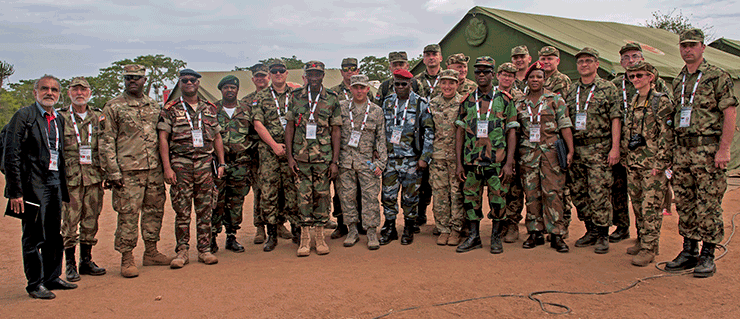Ohio National Guard News
PAMBALA forges new friendships, provides hope for futureStory and photos by Staff Sgt. Wendy Kuhn, Ohio National Guard Public Affairs
PAMBALA 2017, which took place Dec. 4-15, 2017, in the Republic of Angola, was a two-phase combined medical engagement and marked the first time the U.S. was invited to participate in the exercise, through a trilateral agreement between the Angolan Armed Forces, Serbian Armed Forces and Ohio National Guard. The first-of-its-kind engagement provided mutually beneficial training and experience to Angola, Serbia and the ONG and helped to forge some lasting friendships. | READ STORY 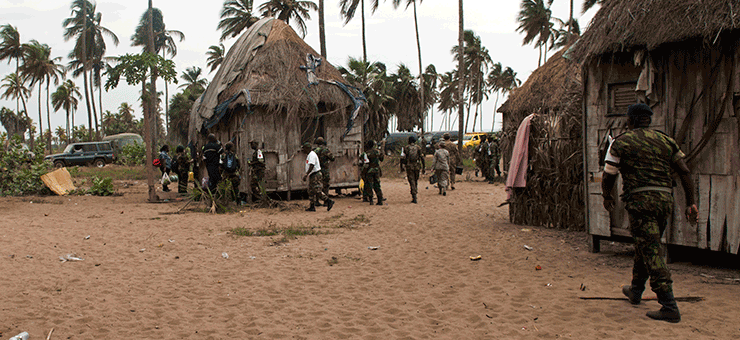 |
|
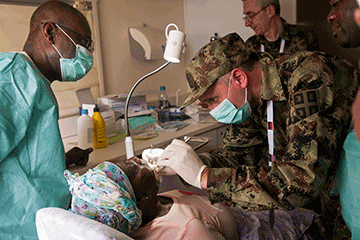 |
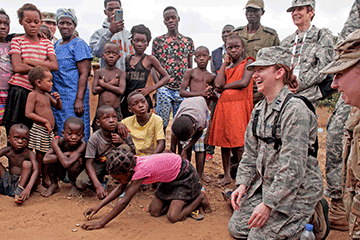 |
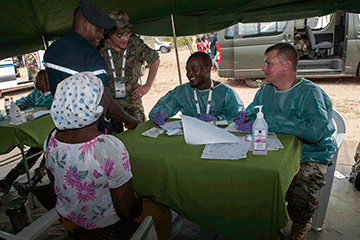 |
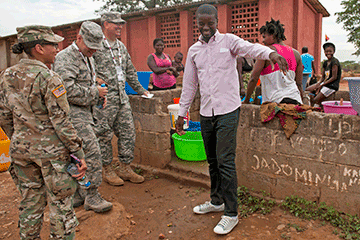 |
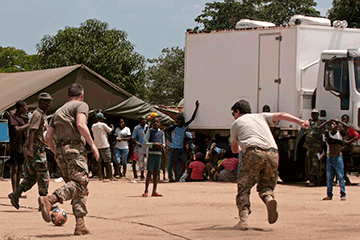 |
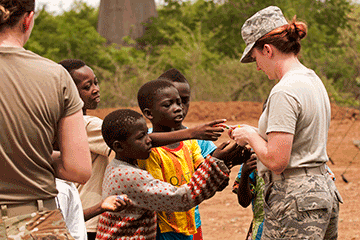 |
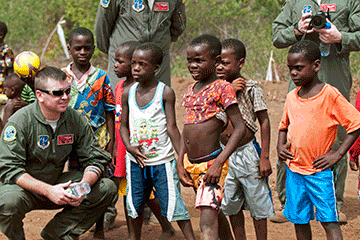 |
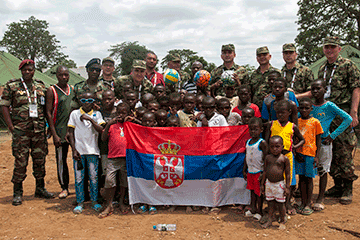 |
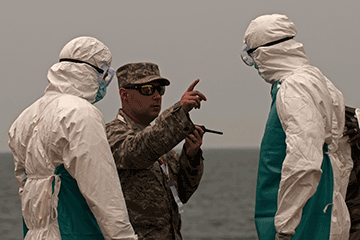 |
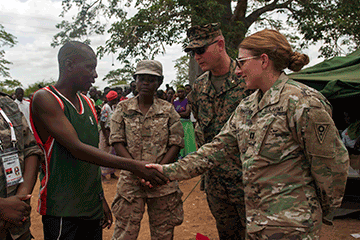 |
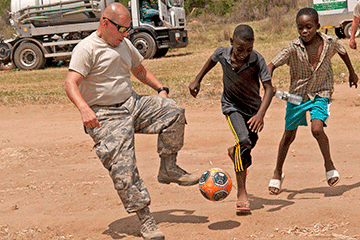 |
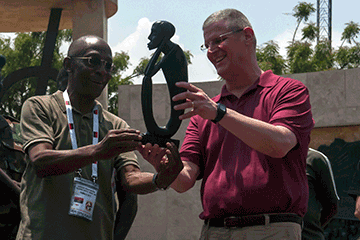 |
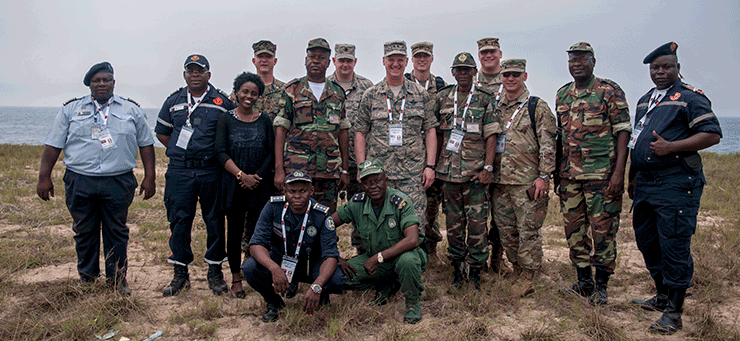 |
|
BENGO PROVINCE, Angola (01/05/18) — It was Henry Ford who once said, “Coming together is a beginning; keeping together is progress; working together is success.” It was that spirit that abounded at PAMBALA 2017, which took place Dec. 4-15. PAMBALA 2017 was a two-phase combined medical engagement, which was the first time the United States was invited to participate in the exercise hosted by the Republic of Angola, through a trilateral agreement between the Angolan Armed Forces, Serbian Armed Forces and Ohio National Guard. The first-of-its-kind engagement provided mutually beneficial training and experience to Angola, Serbia and the ONG and helped to forge some lasting friendships. “Our role here was to assist our Angolan friends,” said Lt. Col. Aleksandar Radunovic, commander of the Serbian Armed Forces for the exercise. “They had the primary, leading role in examining patients. Our role was to discuss patients and different approaches to problems with them, but the final decision for treatment was made by the local doctors.” Serbia has been partnered with the Ohio National Guard through the National Guard State Partnership Program for the past 11 years. Since 1993, the SPP has been connecting states with nations across the globe to enhance interoperability, learn from one another, improve international relationships and promote stability in the region. The first phase of the exercise took place Dec. 4 -9, and consisted of educational training on disease containment and management, tropical diseases and prevention of hemorrhagic fever. During portions of phase one, ONG medical personnel taught classes to Angolans on subjects from disaster response to Ebola. In other portions, Angolans shared their experience and insight with Guard members on tropical medicine and hemorrhagic sickness. However, according to Maj. Adam Bihl, an ONG physician who participated in the exercise, beyond just the information that was shared, much of the benefit came from the new relationships that were built between Angolans and Guard members. “I had great conversations with other physicians between classes that were just as important as all the facts we learned,” Bihl said. During phase two, field hospitals were set up in the villages of Vale do Paraiso and Ceramica for local residents to receive much-needed medical care by Angolan military medical professionals, with medical personnel from the Serbian Armed Forces and the Ohio National Guard present to offer consultation and guidance. During the three days of field hospitals in the two villages, 3,252 patients were treated, with 15 patients evacuated for further care. The highest numbers of patients seen were in the areas of pediatrics, optometry and general medicine with 395, 298 and 251, respectively. “It’s been so helpful for the physicians, nurses and medics to work with their Angolan counterparts and see how they would triage a patient and prioritize their health care,” said Capt. Amanda Harder, ONG medical planner for the exercise. “There are different risks in this part of the world, so coming here and learning how they do things is very insightful.” Military members from several other nations were also invited to observe phase two, including Hungary, which also has been partnered with the Ohio National Guard for more than 20 years through the State Partnership Program, since its establishment in 1993. Also present to observe were representatives from Portugal, Malawi, South Africa and Ivory Coast. “What came to my mind when I first saw this was perhaps we should join this activity because it’s a win-win situation,” said Brig. Gen. Istvan Kopcso of the Hungarian Defence Forces. “First, it’s very good for the local population, but it’s also good for the specialists to have real experiences and learn to use their equipment in some challenging conditions.” The Ohio National Guard also exchanged information in the area of preventative medicine. Maj. Marshal Bickert, a preventative medicine officer for the exercise, was on hand to talk to village administrators and work with them to help assess any major environmental health hazards, such as issues with the water supply and malaria risk factors, and then make recommendations for how those risks could be mitigated. “This was absolutely a beneficial exchange of information with the Angolans,” Bickert said. “The challenge is finding solutions that are practical and sustainable, but some of the basic infrastructure is already in place.” While the field hospitals took place during phase two, members of the Angolan police, firefighting and military forces, along with some Serbian and ONG military members, simultaneously prepared for the final event of the exercise — a demonstration simulating a massive infectious disease outbreak response and containment plan for the epidemic during VIP Day. As with Henry Ford’s words, a new beginning was forged in Angola as members of different countries and cultures “came together” in the spirit of unity and collaboration to compare methodologies and cultivate new ideas. The Ohio National Guard hopes the next step of “keeping together” will continue to build on the progress already made and ensure future successes. “Three nations from three different continents worked hand-in-hand, demonstrating the positive outcome of collaboration and teamwork,” said Col. Thomas Sodeman, commander of the Ohio National Guard military element participating in the exercise. The road to success is difficult, but through hard-learned lessons, countless hours of preparation and a whole-of-government approach, Angola demonstrated a clear capability to conduct inter-agency planning and execution and showcase its readiness to address national emergencies. ... “The United States was honored to participate with our brothers and sisters from Angola and Serbia.” Read more about our partnership with the Republic of SERBIA since 2006. |
|
| |
|
